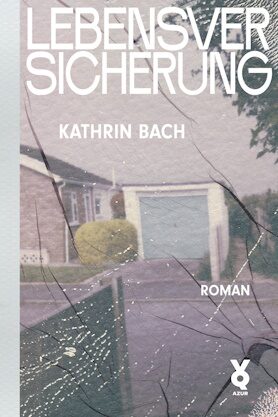Kathrin Bach
Lebensversicherung
[Life Insurance]
- Voland & Quist Verlag
- Dresden and Berlin 2025
- ISBN 978-3-942-37572-6
- 240 Pages
- Publisher’s contact details
For this title we provide support for translation into the Polish language (2025 - 2027).
Sample translations
German Angst
I have every kind of insurance. I have liability insurance, household insurance, a private supplementary health insurance that includes being treated by a head physician and a double room in the hospital, occupational disability insurance and travel health insurance. Accident insurance, supplementary dental insurance, voluntary unemployment insurance and life insurance.
The anxiety-driven first-person narrator, who explores her fear in the text, comes from an insurance agent family in Hessian. Both of her grandfathers had worked for insurance companies. Her father even became a general agent inspector in his father-in-law’s town.
Kathrin Bach’s zippy text oscillates between public, well-ordered space and a rather chaotic private family life. It is less a novel than a transcript from a therapy session – which the first-person narrator had undergone due to her numerous phobias while studying at the university.
I’m scared of eating lunch anywhere other than at home or at Grandma F’s or Grandma G’s. I’m scared of having to eat at a friend’s house. I’m scared that the food that my friend’s mother prepared won’t taste the same as my mother’s. Of not having an appetite or not getting enough. Of feeling too full afterwards. Feeling full is terrible. But nausea is even worse.
The headings of the chapters, some of which are only one or two sentences long, seem like answers to questions asked during a psychotherapy session, including: “How the town looks where I grew up;” “Where my parents come from;” or “Why my father always carries a potential murder weapon by his side.”
The slowly evolving anxiety disorder is only partially rooted in traumatic horrors; rather, it can be traced to this curiously drawn family’s choice of profession, which profits greatly from a ubiquitous “German Angst.” The possibility that anything can happen suffuses the narrator’s childhood and adolescence. Even on Sundays, the parents have sales meetings in their daughter‘s presence. Daily, they record all the damages, accidents, burglaries, fires and deaths that take place in the small town and take care of paying compensation for damages.
If somebody falls and has to stay in the hospital with a broken leg, my mother drives there with a bunch of flowers and asks questions about how the accident happened. When somebody dies, my mother goes and listens to the surviving members of the family. My parents go to all of their clients’ funerals. Sometimes they bring me back a sweet roll.
Much like a patchwork quilt, this book resembles a collage of childhood memories, family chronologies, using specialized and non-fictional texts from the insurance industry and interview transcripts. This zip-lock bag filled with neuroses – MCP drops and Vomex A syrup – include miniatures about snacks and her father’s diabetes through to lists of some of the worst TV series of the 1990s and 2000s.
While this may sound like something of a jumble, the author’s skillful composition creates a unified whole. The recurring phrase: “there is” provides structure, a reassurance within the material world. Kathrin Bach’s story opens with three quotations that incorporate the theme of insurance in a variety of ways: with the truism “Only those who know what their options are for insurance can identify the kind of insurance they need,” from Hans Dieter Meyer’s “Insurance Guide”; with the literary lament “Oh, of all the things that could possibly happen” from the unfinished story by Franz Kafka “The Burrow”, written in 1923/24, who earned his living as an insurance lawyer in Prague, and with a reflection from Ingeborg Bachmann’s first-person exploration novel “Malina” from1971: “There must be an insurance, that is not of this world…”
Bach’s novel “Life Insurance” has many similarities with Bachmann’s “Malina.” Both texts tell stories of a state of mind: on the one hand focusing on experiences of violence, and on the other depicting grotesque scenes in the public sphere. There are various typographies in the text, serious observations are offset by comedy, and the tragic is often a testament to the absurdity of our existence.
“My father sticks his right fist in my face.
- What does it smell like?
- Hospital.
My father nods. My father sticks his left fist in my face.
- What does it smell like?
- Cemetery.
My father nods and grins.
- Good, Jupp.
My father calls me Jupp.
I’m six years old and I don’t know why.”
This collage novel is many things at once: a study of society, a platform for thought, psychoanalysis, slapstick and memento mori. “Life Insurance” seems more saturated with reality than Kathrin Bach’s minimalist poetry collection “Gips” from 2024, which also explores the fragility of our existence through allegory, though on a more abstract, dreamy level.
After reading this laconic debut, you may feel disastrously under-insured but superbly entertained by Kathrin Bach and her first-person narrator, who continues to be scared to the very end because she knows that anybody can pass away at any time, because she knows that any car can crash. But her therapy has an immanent effect. Ingeborg Bachmann’s novel “Malina” ends with the destruction of its narrator. Kathrin Bach’s “Life Insurance,” on the other hand, concludes with the comforting realization that although everything dies, “we also live a little beforehand” – and are allowed to read.
Translated by Zaia Alexander

By Jan Drees
Jan Drees is the literature editor for Deutschlandfunk and host of the radio show “Büchermarkt.” He is on the team of critics for the 3sat broadcast “Kulturzeit,” a member of various juries, and the author of novels and works of nonfiction like “Staring at the Sun” (2000), “Letzte Tage, jetzt” (2011), “Sandbergs Liebe” (2019), and “Literatur der Krise: Das Novellen-Werk von Hartmut Lange” (2022). Jan Drees runs the blog lesenmitlinks.de.
Publisher's Summary
Provincial West Germany in the nineties: boxy new builds on one side of the village, traditional farmhouses on the other. A sports ground, a pub, a bakery, a bus stop. And: an insurance office. The first-person narrator in Kathrin Bach’s prose debut is born into a long line of salespeople. Her parents go on selling what their fathers brought to the local upwardly mobile villages after the war: insurance. As the business continues, it brings modest prosperity – but also everpresent fear. The next disaster is only ever a phone call away.
Life Insurance melds memories, images and lists into a tragicomic family story. Kathrin Bach depicts a very German yearning for security – and the experience that we can’t buy ourselves out of risk and danger. A world in which time is money, and freedom is a two-week holiday every year. And a protagonist who faces her fears to assure her own life through writing.
A family story told in insurance policies.
(Text: Voland & Quist Verlag)
